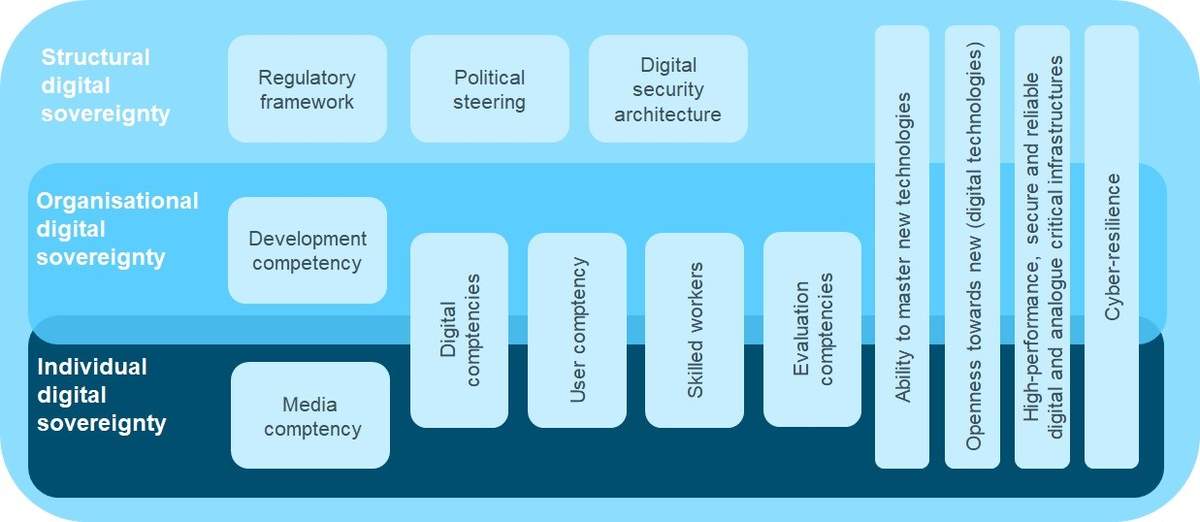
© AdobeStock/spainter vfx
Strengthening Europe's digital sovereignty, avoiding protectionism
The Corona pandemic boosted the digital transformation of Germany’s economy: For example, according to a Bitkom survey, the use of digital solutions in companies was accelerated during the Corona pandemic. At the same time, only 12 percent of all companies still doubt the economic benefit of digitalisation for their company. This compares to 34 per cent that doubted the beneficial nature of digitalisation in 2018. However, the crisis also reveals Europe's need to catch up digitally: for example, companies and the public are often dependent on video conferencing systems and cloud solutions from US or Chinese manufacturers, which in many cases – justified or not – raises far-reaching data protection issues.
Germany and the European Union as a whole have lost their own competences in many technologies that are central to the digital transformation – especially in the B2C sector – or have not advanced the development, implementation and dissemination of these technologies sustainably enough. In order to be more resilient in the future, Europe must now clarify how it can be more resilient in terms of digital skills as well as in the development and production of key technologies such as AI and digital platforms. GAIA-X is a first promising pan-European approach to step-up Europe’s digital sovereignty. Turning towards "business as usual" would endanger Europe's long-term future and competitiveness.
However, while it is important to address concerns regarding Europe’s digital sovereignty in terms of digital, software-based solutions, hardware components must not be forgotten. Semiconductor shortages can also have a significant impact on Europe's long-term resilience and prosperity here. This is because specialised microchips are increasingly being used in emerging technologies, such as edge computing and machine learning. With increasing geopolitical tensions, particularly between the US and China, securing a sufficient supply of semiconductors is paramount for safeguarding Europe’s prosperity. The Corona pandemic has further exacerbated this critical situation by disrupting and in some cases even interrupting the supply chains of globally networked semiconductor production. As a consequence, German’s automotive industry, among others, was forced to stop its production – at least in some factories. Against this background, German industry sees the need for a holistic and long-term European semiconductor strategy that is swiftly implemented.
Towards digital sovereignty
The concept of "digital sovereignty" has long been discussed in the political arena. Digital sovereignty is defined as the ability of citizens, companies, states and communities of states to act in a digitally self-determined manner. This includes the ability to holistically define and implement one's own strategic goals.

Layer model of digital sovereignty (Source: BDI)
From the above elaborated definitions, it follows that Europe's digital sovereignty does not only include a public/state dimension, but rather consists of an interplay of structural, organisational and individual dimensions. For example, companies must possess the ability to develop products, services and infrastructures independently. Also, they should be able to produce them, if required. They also need the ability to evaluate third-party components and to integrate them securely into their own systems.
Citizens must also be empowered to act in a more digitally sovereign way. According to the most recent D21 Digital Index, Germans are far from being digital natives: although eight out of ten Germans can take and send photos with their smartphones, just half of the population can handle common office programmes and only a third can set up a video conference. The current lack of digital knowledge is (partially) due to the lack of structured teaching of digital skills. To ensure that citizens are not left behind in Germany’s digital transformation, a sound knowledge of common IT applications and the secure handling of digital applications and devices are a basic requirement. Strengthening Europe's digital sovereignty will only be possible, if all Europeans are digitally sovereign and digitally competent users.
Strengthening digital sovereignty, embracing globalisation
From the point of view of German industry, the goal of digital sovereignty is both an opportunity and a risk: an opportunity because working towards a more digitally sovereign Europe entails the potential to increasing the resilience of Europe’s society, economy and politics. It could be risk, because it can also lead to protectionism, misallocations and self-sufficiency. Digital sovereignty must not be understood as a departure from globalised production, innovation and value creation processes. Rather, from the perspective of German industry, it is crucial to define all those technologies, competencies and framework conditions that make it possible to maintain a maximum degree of openness and at the same time be more resilient. In its position paper "Strengthening Europe's digital sovereignty sustainably", the BDI outlines a large number of concrete recommendations.
Digital sovereignty is thus not a luxury, but an absolute prerequisite to ensure that no one in Europe is left behind in the age of digital transformation, or even that Europe as a whole becomes dependent on third countries. Europe must therefore promote future-oriented technologies, strengthen the necessary skills and establish a holistic ecosystem.
Just an example of how these three dimensions mesh like gear wheels: The European Commission must support the development of forward-looking digital business models with an innovation-friendly framework. Building on the industrial strength of German industry, numerous companies - from start-ups to SMEs and international corporations - operate their own platforms. In addition, two-thirds of German companies state that digital platforms ensure the future viability of their business. This example demonstrates that the European Commission and national governments should provide a regulatory framework supporting the ideal position, in which many European companies are at the moment. Europe possesses an outstanding B2B platform-landscape. To ensure that these platforms remain economically competitive, an innovation-friendly regulatory framework and investments in digital skills are urgently required.



